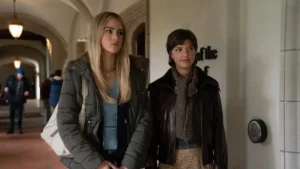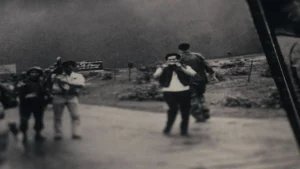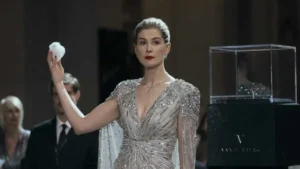Summary
Home invasion, marital drama, and an invisible puppet master: all ingredients for a gripping psychological horror.
In Held, we meet Emma and Henry Barrett (Jill Awbrey and Bart Johnson), a couple whose marriage has clearly hit a rocky patch after nine years. Their anniversary prompts them to reconnect and they take a weekend away in a sophisticated rental home. Soon after they both arrive, though, someone they cannot see takes control: Emma and Henry are trapped and obliged to follow the instructions and marriage guidance of a sinister voice, at risk of pain inflicted remotely. Secrets emerge, trust becomes tested and tension grows: Held is uncommonly gripping.
Directed by Travis Cluff and Chris Lofing, Held couldn’t be more different from The Gallows and The Gallows Act II that they both made together previously. It is not supernatural horror, nor reliant on jumps in the dark: this is a brightly lit, patient, and civilized film. It is tense from the start, though in a restrained way at first: after a brief (unnerving) prologue, we watch Emma arrive at the house, clearly a little nervous, and almost encouraged to be so by a distinctly traditional taxi driver, who suggests her husband might be worried about her spending a night on her own in a strange place. She accepts Henry telling her what to do in the face of an apparent crisis, so it’s easy to wonder if she will easily go along with declarations about a wife’s “place” from the disembodied voice.
I’m sure many people have had to spend time cooped up with a partner in recent months. Held condenses this marital cabin fever to a single twenty-four hour period, with the addition of enforced stereotypical roles (“the man opens the door for the woman” etc) and an obligation to be honest, immediately and without fail. Jill Awbrey has written a psychological horror encapsulating the fragile male and trapped female types (and performs the latter too). In these conditions, it is no surprise that the tension I’ve already mentioned grows tighter with every scene, especially when other people enter the picture, one by one.
Despite the small cast, Held still delivers some Hitchcock-style twists and turns. The only notable flaw in the writing is how the old incident in the prologue and its relevance are left unexplored. Actually, the “ideal” husband and wife might have fitted neatly into Hitchcock’s catalog too, now I think of it. There is a distinct suggestion from the man behind the curtain in Held that obedience and structure are key to a successful marriage, and it almost sounds desperate to get back to the values of the past. I don’t know if Awbrey is warning us of those attitudes or showing them up as ridiculous, but there is certainly an element of satire here.
The set is beautiful, with clean white décor inside and an orchard outside; a location Kubrick might have been proud to use. A good deal of the film is without music, and when Richard Breakspear’s sparsely dark score emerges it complements the production with its simplicity and polish, just as it emphasizes the drama.
I must say, when Held’s reveal came, I told myself “I knew it!” But although it all made sense, I hadn’t really seen it coming, as the direction was such that it felt impossible to guess what was going on even though the clues were there. And there were still more clever moves after that too.
Held’s world premiere was screened at FrightFest, October 2020.



